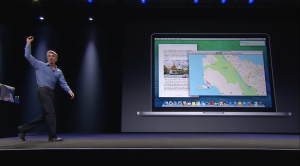
Apple software honcho Craig Federighi jauntily waves to the WWDC audience as he takes the stage in San Francisco on June 2, 2014
Lots of people–journalists, bloggers, analysts, random bystanders–love to to make grand pronouncements on where Apple is going. Very few are good at it. And part of the problem is that it isn’t even all that easy to understand the state of Apple right this very minute.
I’ve been thinking about that as I ‘ve read coverage of the news which the company has made over the last couple of weeks–which has included its acquisition of Beats and a WWDC keynote which, while devoid of new hardware, was bursting at the seams with wildly ambitious plans for software and services. Apple as of mid-June of 2014 is interesting in ways which I don’t think anyone was predicting even in late April, before the Beats scuttlebutt emerged and it became clear that WWDC wasn’t going to involve major hardware announcements.
Which means that even the best commentary on recent Apple developments–such as Joshua Topolsky’s “Meet the New Apple“–is playing catch-up with developments which Apple has been secretly working on for months or, in some cases, years. (The new Swift programming language began as a personal project in 2010.)
Topolsky’s piece is full of words which very few observers would have applied to Apple even the week before WWDC: fun confidence, buoyant, giddy and even open. If it’s reasonable to apply them to the company now–and I believe that it is–it’s not because a switch flipped at the WDDC keynote. It’s because Apple was already changing in ways we didn’t yet understand.
Of course, the same basic dynamic is an issue with nearly all analysis of almost every company: When Google holds its IO conference later this month, it’s entirely possible that it will reveal something which will render some of our current impressions of the company obsolete.
But perception lagging reality is a bigger factor with Apple than with most companies, for several reasons:
- Apple really is going through a big, unpredictable shift, not just because Tim Cook isn’t Steve Jobs but because he has a new team. (As Ben Thompson of Stratechery points out, nearly 60 percent of the company’s current top managers weren’t in their jobs in 2010.)
- Apple spends less time talking about its future–even in broad strokes–than most companies, which sometimes leaves those of us on the outside blissfully ignorant of where it’s headed until it’s well on its way to getting there.
- People tend to have deeply-held attitudes toward Apple–be they positive or negative–which they have trouble putting aside even when the facts suggest such attitudes may need reassessing.
I don’t mean any of this as a knock on Apple commentators. (At least the smartest ones, a group which certainly includes Topolsky and Thompson.) There’s no shame in only being able to articulate things about a company once the evidence is in.
Actually, that’s a far better way to shed light on Apple than the blustery predictions which so often pass for analysis–and which, to the extent they’re taken seriously, mostly serve to damage the world’s understanding of Apple rather than increase it.
